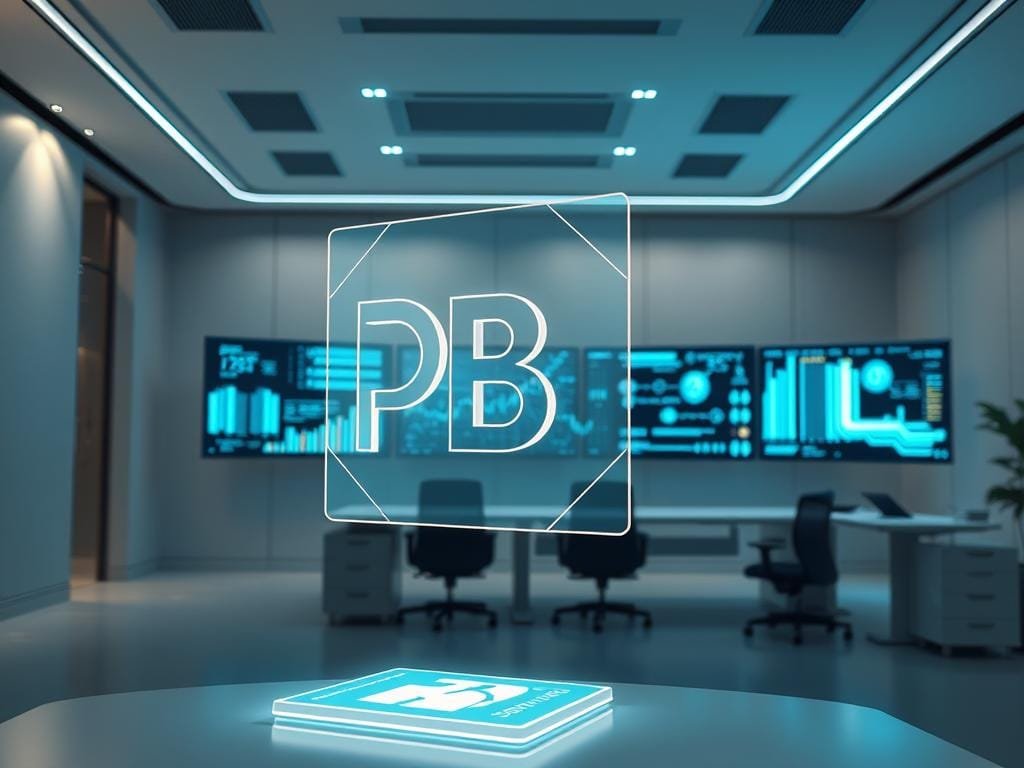You might be surprised to learn that decentralized technology is changing industries beyond cryptocurrency. Blockchain, the tech behind Bitcoin, is growing in many fields. It offers secure, clear, and efficient data handling.
Exploring blockchain, you’ll see its big impact on areas like supply chains, healthcare, and finance. It makes data sharing safe and open. This is changing how businesses work and talk to their customers.
Key Takeaways
- Blockchain technology is being adopted beyond cryptocurrency.
- Decentralized networks are boosting data security and transparency.
- Many industries are using blockchain for better operations.
- Blockchain’s reach includes supply chains, healthcare, and finance.
- Businesses are using blockchain to enhance stakeholder interactions.
Understanding Blockchain Technology
Blockchain is more than just for cryptocurrency. It’s a digital ledger that makes transactions safe, open, and unchangeable. This technology is changing many industries.
Definition and Core Components
Blockchain is all about being decentralized, transparent, unchangeable, and secure. It’s made up of blocks, each with a list of transactions. These blocks are linked by cryptography, keeping data safe and in order.
The main parts of blockchain are:
- A network of nodes that check and approve transactions.
- A way to agree on data integrity.
- Algorithms that protect data and control access.
How Blockchain Works
Blockchain works in several steps. First, a new transaction is made and shared with the network. Nodes verify it using complex algorithms. Then, it’s added to a block with other transactions.
This block is then added to the blockchain, making a permanent record. For more on blockchain, check out Digital Vista Online.
Public vs. Private Blockchains
Blockchains are either public or private, each with its own use. Public blockchains are open to everyone, allowing free transactions. Private blockchains are for a select group, often used by companies.
Knowing the difference between public and private blockchains helps choose the right one for your needs. Public blockchains offer transparency and freedom. Private blockchains give more control.
The Rise of Blockchain in Finance
Blockchain is changing finance by making transactions secure and efficient. It’s a big change in how we get financial services. Blockchain technology is making a big impact.

Decentralized Finance (DeFi)
Decentralized Finance, or DeFi, is a big step in blockchain. It lets you use financial services like lending and trading without banks. DeFi works on a peer-to-peer network, making transactions faster and cheaper.
For example, DeFi protocols are changing how we deal with money. They give you more control over your assets.
Cross-Border Payments
Blockchain is also changing how we send money across borders. It makes these payments fast, cheap, and secure. Before, sending money abroad took days and cost a lot. Now, it happens in seconds and costs less.
| Feature | Traditional Payments | Blockchain Payments |
|---|---|---|
| Settlement Time | Several days | Real-time |
| Transaction Fees | High | Low |
| Security | Variable | High |
Smart Contracts in Banking
Smart contracts are contracts that run on their own. They’re programmed to do things automatically. In banking, they help make things more efficient and cut down on errors.
Smart contracts in banking mean faster and cheaper services. For instance, they can handle transactions without human help. This makes banking smoother.
As blockchain grows in finance, we’ll see more cool uses of cryptocurrency and blockchain. It’s an exciting time for finance.
Supply Chain Management Revolutionized
Blockchain is changing supply chains, bringing transparency and traceability to new heights. This change is key in today’s global market. Consumers want to know where and how their products are made.
Enhancing Transparency and Traceability
Blockchain makes transparency better by keeping a permanent record of all supply chain transactions. This means every step, from making to delivering, is documented and shared with everyone involved. For example, Walmart and Nestlé are using blockchain to track their products. This helps ensure they are real and cuts down on fake goods.
Blockchain also makes traceability easier. If a product needs to be recalled, companies can quickly find out where it came from. This helps keep consumers safe and reduces the impact on the business.
Reducing Fraud and Counterfeiting
Blockchain is great at reducing fraud and counterfeiting. It keeps a secure record that can’t be changed. This means products are real and haven’t been messed with while they were being moved. De Beers is using blockchain to track diamonds, making sure they are genuine.
- Benefits of blockchain in reducing fraud include:
- Immutable records
- Real-time tracking
- Enhanced security
Case Studies: Companies Leading the Way
Many companies are using blockchain in their supply chains. Here are a few examples:
- Walmart: They’ve started using blockchain to track produce. This has made food safer and quicker to trace if there’s a problem.
- Nestlé: They’re tracking coffee beans with blockchain. This ensures the quality and authenticity of their coffee.
- De Beers: They’re using blockchain to track diamonds. This verifies their origin and reduces the chance of fake stones.
These companies show how blockchain can improve transparency, tokenization, and efficiency in supply chain management.
Transforming Healthcare with Blockchain
Blockchain is changing healthcare by making it more decentralized and secure. It’s being used in many ways to better patient care and protect data.

Secure Patient Data Sharing
Blockchain makes it safe to share patient data among doctors. It uses cryptography and a network that’s not controlled by one person. You can learn more by visiting this link.
It also builds trust between patients and doctors. It lets everyone see updates in real time, making care better.
Streamlining Clinical Trials
Blockchain helps make clinical trials better by being open and cutting down on fraud. It does this with smart contracts that make sure everything follows the rules.
- Improved data integrity
- Enhanced transparency
- Reduced risk of fraud
With blockchain, clinical trials can work faster. This means new treatments can come out quicker.
Telemedicine and Blockchain Integration
Blockchain is also changing telemedicine. It makes patient data safer during online visits.
Blockchain-based telemedicine platforms keep medical records safe. This helps doctors work together better.
Blockchain in Digital Identity Management
Blockchain is changing how we think about digital identity. It brings better security and privacy to users everywhere. This technology makes managing digital identities safer and more open, cutting down on identity theft and fraud.
Benefits of Self-Sovereign Identity
Blockchain-based digital identity management brings self-sovereign identity to the forefront. This means people control their own data, deciding who sees it and when. Self-sovereign identity lets users manage their digital lives securely and easily.
Smart contracts make things even better by automating checks. This ensures data is shared safely and follows privacy rules. It boosts transparency and builds trust in digital dealings.
Use Cases in Government Services
Governments globally are embracing blockchain for digital identity in public services. For example, Estonia has a blockchain-based national ID system. It gives citizens safe and clear access to public services.
India and Singapore are also looking into blockchain for identity checks in government. They hope to cut down on fraud and make public services more efficient.
Combatting Identity Theft
Identity theft is a big issue in our digital world. Cybercriminals keep finding new ways to misuse personal info. Blockchain offers a strong answer with its digital ledger that can’t be changed or hidden.
With blockchain, people and groups can lower identity theft risks a lot. Its decentralized setup means there’s no single weak spot. Hackers find it much harder to mess with or steal identity data.
The Role of Blockchain in Real Estate
Blockchain is changing the real estate game. It makes buying and selling properties faster and safer. This tech is making the industry more open and honest.
Simplifying Property Transactions
Blockchain cuts out the middlemen in property deals. This speeds up the process and saves money. It’s a big win for everyone involved.
With blockchain, all parties see the same info. This cuts down on disputes and mistakes. Smart contracts make sure deals happen as planned.
Tokenization of Real Assets
Blockchain brings tokenization to real estate. It turns property rights into digital tokens. This lets more people invest in real estate.
Tokenization makes real estate more liquid. It breaks down big assets into smaller, more affordable pieces. This opens up new investment chances for many.
Reducing Fraud in Real Estate Deals
Blockchain fights fraud in real estate. It creates a permanent record of who owns what. This makes it tough for scams to succeed.
Blockchain builds trust in real estate. It’s key when big money is involved. This tech helps keep deals honest and secure.

| Benefits | Description |
|---|---|
| Simplified Transactions | Blockchain enables peer-to-peer transactions, reducing the need for intermediaries and increasing efficiency. |
| Tokenization | Allows for fractional ownership, making real estate investment more accessible and enhances liquidity. |
| Reduced Fraud | Immutable records of property ownership and transactions reduce the risk of fraudulent activities. |
Energy Sector Innovations Through Blockchain
Blockchain is changing the energy industry with decentralized solutions. It makes energy distribution more efficient. It also encourages the use of renewable energy.
Peer-to-Peer Energy Trading
Peer-to-peer energy trading is a big innovation. It lets people buy and sell energy directly. For example, a homeowner with solar panels can sell extra energy to a neighbor.
Improving Grid Management
Blockchain helps manage the grid better. It uses smart contracts for tasks like metering and billing. This makes the grid more efficient and reliable.
Renewable Energy Certificates
Blockchain also helps with Renewable Energy Certificates (RECs). These certificates prove energy comes from renewable sources. Blockchain makes sure RECs are real and can’t be faked. Learn more about blockchain in energy at Consensys.
| Application | Description | Benefits |
|---|---|---|
| Peer-to-Peer Energy Trading | Direct energy trading between individuals | Reduced reliance on grid, increased efficiency |
| Grid Management | Automation of grid processes using smart contracts | Lower operational costs, enhanced reliability |
| Renewable Energy Certificates | Tracking and verification of renewable energy generation | Increased transparency, trust in renewable energy market |
Blockchain is key to the energy sector’s future. It makes energy systems more efficient, transparent, and decentralized. This will change how we produce, use, and trade energy.
The Impact of Blockchain on Intellectual Property
Blockchain is changing how we protect intellectual property. It brings transparency and security to creators. This technology is great for managing copyrights and trademarks.
Protecting Copyrights and Trademarks
Blockchain is perfect for registering and managing intellectual property. It creates a permanent record of ownership. This stops unauthorized use and ensures creators get paid fairly.
Cryptography helps keep these records safe. It makes it hard for bad actors to change or fake the data.
The Verisart platform uses blockchain to check and confirm artworks. This proves their authenticity and history. It helps artists and makes buyers trust the art market more.
Smart Contracts for Licensing
Smart contracts are changing licensing agreements. They are self-executing contracts with the agreement written in code. This makes agreements more transparent and cuts out middlemen.
Creators can use blockchain-based smart contracts to control how their work is used. They can set royalty rates and payment terms. These rules are followed automatically when certain conditions are met.
Case Studies of Successful Implementations
Many companies have used blockchain to protect intellectual property. Here are a few examples:
| Company | Industry | Blockchain Application |
|---|---|---|
| Verisart | Art | Verifying and authenticating artworks |
| UPR | Music | Managing music rights and royalties |
| Po.et | Publishing | Creating a decentralized registry for intellectual property |
These examples show how blockchain can change the intellectual property world. It offers a secure, transparent, and efficient way to manage creative works.

Enhancing Voting Systems with Blockchain
Blockchain is changing voting systems for the better. It makes elections more transparent and secure. This technology is a big step forward for voting.
Ensuring Transparency and Security
Blockchain creates a decentralized ledger that keeps votes safe and unchangeable. This ensures the voting process is fair and honest. It also protects votes by encrypting them, making it hard for others to mess with them.
Blockchain brings many benefits to voting:
- Immutable vote recording
- Transparent vote counting
- Enhanced voter verification
Benefits of Blockchain Voting
Blockchain voting is convenient and secure. It lets people vote from anywhere, saving money and time. It also makes it easier to check if the vote was fair.
| Feature | Traditional Voting | Blockchain Voting |
|---|---|---|
| Security | Prone to tampering | Immutable and tamper-evident |
| Transparency | Limited auditability | Transparent and auditable |
| Accessibility | Limited to physical locations | Remote voting possible |
Global Examples of Implementation
Many countries are using blockchain for voting. Estonia is a great example, making voting safe and easy from anywhere. In the U.S., Denver, Colorado, has tested blockchain voting in local elections.
Blockchain is making voting better. It makes elections more transparent, secure, and trustworthy.
Future Trends: What’s Next for Blockchain?
Blockchain technology is getting better, and you can look forward to big changes. It will work better with new tech like tokenization of assets, decentralized finance (DeFi), and the Metaverse. All these will grow thanks to blockchain.
Emerging Technologies and Blockchain
Blockchain will team up with tech like Artificial Intelligence (AI) and the Internet of Things (IoT). This will open up new ways to use blockchain. For example, blockchain can make IoT devices safer, and AI can make blockchain networks work better.
Predictions for Industry Transformations
Blockchain will change many industries, like finance, supply chain, and healthcare. Banks have seen a 67% drop in fraud thanks to blockchain, Digital Vista reports. Expect even more changes as blockchain gets better.
The Role of Regulatory Developments
Rules and regulations will shape blockchain’s future. Good rules will help it grow, but bad ones might slow it down. Keep an eye on these changes to understand how they affect blockchain.
FAQ
What is blockchain technology, and how does it work?
Blockchain is a digital ledger that records transactions. It’s decentralized and uses cryptography for security. It works by linking blocks of transactions, verified by nodes on the network.
What are the differences between public and private blockchains?
Public blockchains are open networks, like Bitcoin. Anyone can join. Private blockchains are closed, used by companies. They offer more control over data access.
How is blockchain being used in the finance sector?
In finance, blockchain supports DeFi and fast payments. It also uses smart contracts in banking. This makes transactions quicker, safer, and more transparent.
Can blockchain help reduce fraud in supply chain management?
Yes, blockchain can reduce fraud in supply chains. It makes transactions transparent and traceable. This helps verify goods’ authenticity and origin, cutting down on counterfeiting.
How is blockchain being applied in the healthcare sector?
In healthcare, blockchain improves data security and streamlines trials. It creates a secure platform for data sharing. Smart contracts automate processes, making healthcare more efficient.
What are the benefits of using blockchain for digital identity management?
Blockchain enhances digital identity security and gives users control over their data. It creates a decentralized, immutable record of identity. This reduces identity theft risk.
How is blockchain transforming the real estate industry?
Blockchain simplifies real estate transactions and tokenizes assets. It reduces fraud, making investments more secure and transparent. This opens up new investment opportunities.
What are the innovative applications of blockchain in the energy sector?
Blockchain is used for peer-to-peer energy trading and grid management. It promotes renewable energy and increases efficiency. It also enables new business models, like energy trading platforms.
How is blockchain impacting intellectual property protection?
Blockchain protects copyrights and trademarks securely. It creates a decentralized record of ownership. Smart contracts help manage licensing, safeguarding creators’ rights.
Can blockchain enhance voting systems?
Yes, blockchain makes voting systems more transparent and secure. It creates a decentralized, auditable record of votes. This reduces tampering risk, boosting electoral trust.
What are the future trends in blockchain technology?
Blockchain’s future includes integration with AI and IoT. It will transform industries and be shaped by regulations. This will lead to more adoption, innovation, and acceptance.
